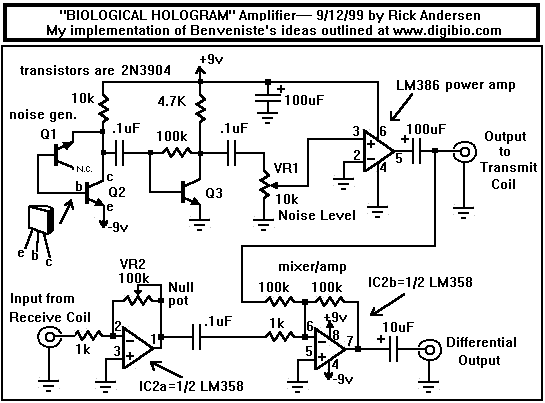Предлагаемая установка позволяет переносить информацию о химическом составе,
свойствах, параметрах раствора вещества на дистиллированную воду.
Установка позволяет записывать и хранить информацию о веществе на цифровых носителях
информации и при необходимости "клонировать" раствор вещества.
В связи с высоким риском применения установки в противозаконных целях
(клонирование растворов наркотических средств, дорогостоящих, отпускаемых по
рецепту лекарств) мы приводим техническое описание установки на английском языке.

Circuit Operation:
NPN transistor Q1 is connected "upside-down" to put it into the avalanche
mode-- this generates white noise. Q1's noise current biases Q2's base, and
Q2 amplifies the white noise signal. Q3 provides another stage of gain for
the noise. VR1 serves as a "volume" control; the amount of signal picked off
at the wiper is variable and is sent to IC1, a 100 mW audio power amplifier.
The amplified output is sent to the output jack which will connect to the
"transmit" coil. The transmit coil broadcasts a white-noise magnetic field
into the sample under study.
Some distance away, a "receive" coil picks up the white noise, which we
presume is altered in intensity, frequency response, and phase, in small but
measurable amounts. [An alternate, or parallel, explanation is that beat
frequencies in the audio range are produced by small amounts of nonlinear
mixing, as the wide range of random frequencies inherent in white noise
interact with the molecular resonances in the sample.]
Op amp IC2a amplifies the receive coil's output, which
will be attenuated with increasing distance from the transmit coil. In
Benveniste's experiments, the small distance between coils was occupied by
a test tube filled with water and the particular chemical under study. The
solution could be viewed as the core of a transformer whose windings are the
transmit and receive coils.
After amplification by IC2a, the received signal is mixed (summed) with the
original "reference" noise signal. The phasing (connection polarity) of the
receive coil is such that the original reference noise and the altered noise
from the receive coil and amplifier will "null" or cancel each other at some
setting of the amplifier gain potentiometer VR2.
If the reference and the receive coil's noise signals are identical, the null
should be quite deep (discounting differences in the frequency/phase response
between the two signal paths); the assumption is that there will in fact be
a small residual signal which cannot be cancelled out-- this "differential"
signal represents the "information" impressed by the sample upon the reference
noise.
This "distortion" or alteration of the "reference" noise represents
absorption/reflection of energy by the sample under study. It is assumed to
be analogous to an object being holographically recorded, as in laser
hologram technology. We uncover the small distortions imparted to the noise
by the sample, by mixing the reference back in with the altered signal, but
180 degrees out of phase. This is analogous to creating the interference
patterns on film in laser holography.
The residual signals present in the differential mix are amplified by IC1b
and sent to the output jack as the "differential output".

